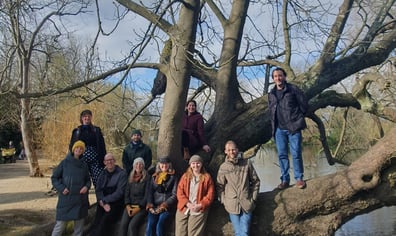About us
Who we are
The Centre for Sustainable Healthcare (CSH) is an independent, non-profit organisation that has been at the forefront of driving sustainable, net zero and carbon reduction initiatives within the healthcare sector since 2008. This is our story…
Early years
Founded by Rachel Stancliffe and Sir Muir Gray in 2008, in response to a lack of any visible work on sustainability in the NHS, the Campaign for Greener Healthcare brought together experts in medicine, public health, research, and environmental consultancy to galvanise action.
Many people at this time were still not aware of the problems of human impact on the environment and we had to do a lot of persuading of those working in healthcare that there were links between health and climate change. Because we saw the urgency of the need for big and rapid change in the system and the field of sustainable healthcare was entirely new, we knew there was a huge amount to do: we were simultaneously establishing the need for this, defining what it was and developing programmes to support it.
Healthcare at the heart
We were a very small organisation so we knew that we would have to work with a lot of partners. Sustainability organisations who were starting to work in the health sector in 2008 were focused on infrastructure, energy and recycling. We understood that this was not the heart of healthcare. Installing new boilers, changing light bulbs and putting in better bins was only going to get us so far; without engaging the healthcare professionals and patients, any efforts to make the system truly sustainable would be impossible.
The first carbon footprint of the NHS in England was published just after we started, and it showed that buildings and energy on site were only responsible for 20% of the whole; another 15% was travel and the rest – mainly pharmaceuticals and medical devices – were directly influenced by the care and the way that it was given to patients.
Working from within
The campaign quickly evolved into the Centre for Sustainable Healthcare because, alongside advocating for change, we were mainly focusing our efforts on supporting people to make change in very practical ways and identifying strategic levers in the system that would enable sustainability to be embedded.
In a system as large and complex as the NHS, we knew that to make lasting change we would need to work closely with people working in different parts of the system on ‘HOW’ this change would actually happen, rather than come up with another ‘SHOULD do’ set of documents from outside. We also realised that, in such a new field, to find solutions we would need to collaborate with all stakeholders: patients and practitioners, NHS leaders, journal editors, researchers and industry.
The CSH theory of change
We understood early on that, given the complexity and size of the healthcare system, we would not be able to come up with ‘solutions’ from the outside. To achieve rapid transformation, we knew that we had to inspire people in the system with the need for change and empower them with the knowledge and tools to make positive changes. Our work soon demonstrated that sustainable healthcare was aligned with better outcomes for patients and also saved money.
Communities of practice
The natural communities of practice in healthcare are the specialties, or disease areas, and we chose to work primarily with these groups, which cut across the organisational silos in healthcare, pushing for system transformation based on our principles of sustainable healthcare.
We developed programmes designed to support change in communities of practice, with dual purpose: they would engage and train people at the same time as making changes in practice. We collected these examples of change and made them available to spread ideas and spark discussion and growth in this field via publications, presentations and our own website.
Upstream thinking
One of our main aims was to support the health system to look upstream and to think about how to move upstream and include prevention (even when we were working with secondary care). One of the ways we did this was to talk about positive health, not just absence of illness, and bring public health and local authority people into our work.
Connecting to the natural environment
As part of this, we helped to bring nature and health closer together through programmes such as The NHS Forest. We discussed the concept of green space for health in many different fora and introduced people across the sectoral divide so that environmental organisations could include healthcare professionals in their work and take the area forward.
The CSH Principles of Sustainable Healthcare
The CSH Principles of Sustainable Healthcare were developed by CSH’s Dr Frances Mortimer as fundamental guiding principles to improve healthcare design, delivery and best practice; these are prevention, patient self care, lean service delivery and low carbon alternatives.
A growing influence
Over time, these principles were increasingly adopted as the basis for all sustainable initiatives in the healthcare sector, and the work CSH was doing helped to develop thinking around the NHS sustainable development unit in 2012 and ultimately influencing the Greener NHS policies and frameworks. By working alongside a growing network of healthcare professionals, CSH avoided the top down approach and built on the theory of change from within. This dedicated approach empowered healthcare professionals to change patient care and establish new benchmarks for best practice, and allowed the sector as a whole to take CSH principles on board when establishing their own sustainable guidelines to conform to ever changing sustainable legislation.
A growing organisation
As sustainability within healthcare moves beyond a buzzword into necessary change backed by legislation, CSH itself has grown and expanded. CSH now has a core team of experts in the fields of healthcare, sustainability and environmental consultancy, and an ever-growing family of dedicated fellows, scholars and volunteers within the healthcare sector and beyond.
A growing reputation
CSH experts are invited to speak at international conferences on sustainable healthcare all over the world, and the ongoing research and pioneering work undertaken by CSH has continued to push the boundaries of sustainable healthcare and has revolutionised the way the healthcare sector works.
CSH’s flagship SusQI programme, a model illustrating how individuals can change and shape best practice to be more sustainable from the ground up, is being adopted by more and more healthcare teams across the world. Our world renowned and accredited courses are an integral part of many healthcare professionals’ continuing professional development and education, embedding sustainable ways of thinking into the next generation of professionals.
How we work
CSH was born, and will always have its heart, in Oxford, but our expanding team of international experts is situated all over the UK, the EU and beyond. In line with our sustainable ethos, we minimise the daily commute by working online. This provides us with the freedom and efficiency to tap into the best and brightest minds in their fields while making a positive impact on the environment in the way we work. From measuring and reducing our own carbon footprint to prioritising the health, wellbeing, and work/life balance of those in our team, the CSH team practices what they preach every day.
Toward the future
CSH has always been ambitious because we have to be – there is so much to do! From its start with a few determined colleagues trying out ways to change the healthcare system to be more sustainable, the organisation has grown into a highly respected team of experts in sustainable healthcare research and practice. CSH pioneered bringing clinical practice into sustainable healthcare and has influenced many other organisations in the UK and globally. By developing strong networks and building a rigorous base of research and case studies, we continue to support people and organisations to bring knowledge into action for a sustainable future.
As CSH grows and increases its impact so too does its message that good quality healthcare is sustainable healthcare.
Our culture and values
Our vision
All people in the health system are able to shape and deliver sustainable healthcare which supports our communities and our natural world.
Our mission
To inspire and empower people with the knowledge, skills and tools to play their part in the transformation to sustainable healthcare.
Our impact
- 816 + Tonnes of CO2e - Reduced a projected 12K+ tonnes of carbon emissions across 50 global healthcare facilities
- £2.6 Million + Saved - Implemented sustainability initiatives that are projected to save the NHS over 2.6 million
- 3000+ Professionals - Trained over 3000 healthcare professionals in sustainable practices
We are
Bold – we challenge the status quo and pursue ambitious goals with confidence and resilience.
Collaborative – we actively unite diverse skills and perspectives in a nurturing environment.
Creative – we inspire, develop and empower fresh ideas that cross traditional boundaries.
Rigorous – we act with integrity, challenge ideas and seek evidence-based solutions.
Practical – we create tangible impact, rooted in real world feasibility.
Equality, diversity and inclusion policy
The Centre for Sustainable Healthcare (CSH) recognises, and values people’s differences and the strength and power of our diverse community will support us all to reach our sustainable healthcare goals. CSH will do all it can to ensure it is committed to diversity in all areas of our work. We believe that we have much to learn and gain from diverse cultures, experiences and perspectives and that diversity will make our organisation more effective.
Commitment to equality, diversity and inclusion
CSH is committed to creating and sustaining a positive and inclusive working environment for all employees. Our aim is to ensure that all members of staff, volunteers and any members of the wider community that works with or alongside our organisation are equally valued and respected as unique individuals, and are treated as such at all times as part of our fundamental values. Our commitments include:
- To foster an environment in which individual differences and the contribution of all team members are recognised and valued.
- To foster an environement of belonging for all employees.
- To provide equality of opportunity to all employees regardless of race, gender, age, sexual orientation or any other inherent characteristic.
- To have zero tolerance for any form of unacceptable behaviour, harassment, discrimination, bullying (including cyber bullying) or victimisation
- To provide consistent and ongoing training and development opportunities that promotes awareness, understanding and appreciation of diversity.
- To ensure that all compensation practices within CSH are fair and transparent and based on skills, experience and performance without discrimination.
- To creating a digitally and physically accessible envioronment that accomodates the needs of all individuals.
- To regularly monitor and review all diversity and inclusion initiatives to ensure progress and identify any areas for improvement.
We require all members of our community to recognise these commitments and act in accordance with them. In addition, we will comply with all relevant legislation and good practice.
Dealing with discrimination
Unacceptable behaviour, harassment, discrimination, bullying (including cyber bullying) or victimisation of any individual is perceived as contradictory to our aspirations for a supportive working environment and will not be tolerated. Any allegations of such behaviour will be taken seriously, and dealt with promptly and with due sensitivity, and in accordance with CSH’s Equality, Diversity and Inclusion Policy and any relevant legislation under the Equalities Act 2010.
Organisational and individual responsibilities
Our Board of Trustees has overall responsibility for ensuring that we operate within a framework of equality of opportunity and our senior management team is responsible for disseminating and enforcing all policy and procedure throughout the organisation. All employees have an individual duty to support and uphold the principles of equality, diversity and inclusion and its supporting policies and procedures.
This statement will be reviewed regularly and revised if necessary in the light of legislative or organisational changes.








